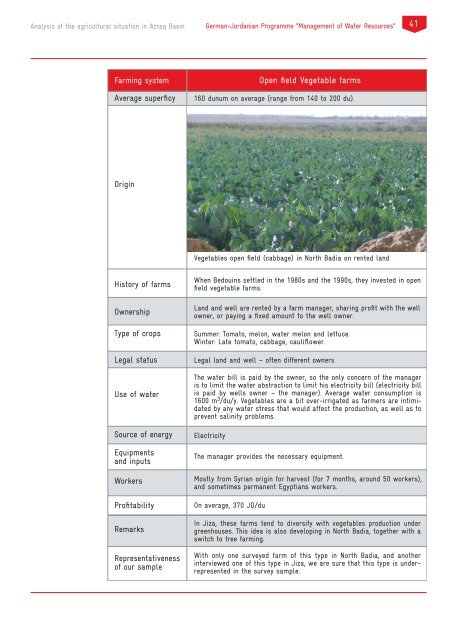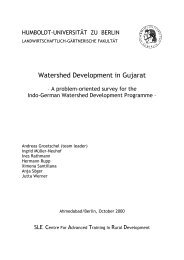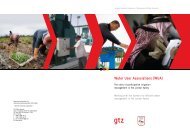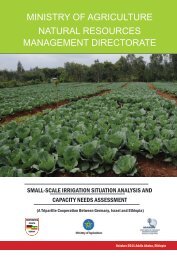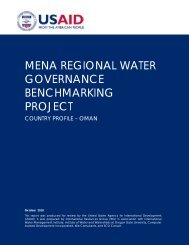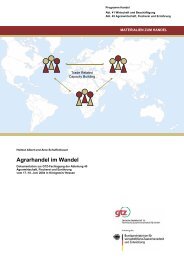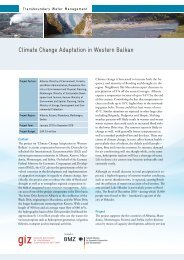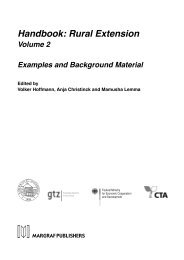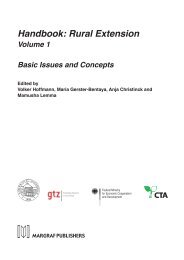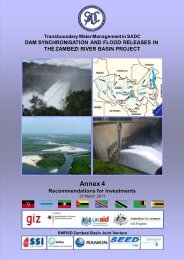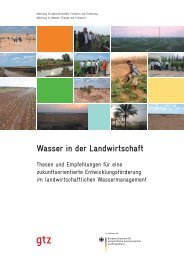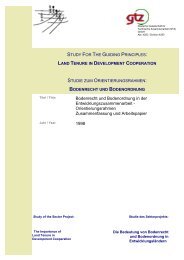Farming in the - WordPress.com
Farming in the - WordPress.com
Farming in the - WordPress.com
You also want an ePaper? Increase the reach of your titles
YUMPU automatically turns print PDFs into web optimized ePapers that Google loves.
Analysis of <strong>the</strong> agricultural situation <strong>in</strong> Azraq Bas<strong>in</strong><br />
German-Jordanian Programme “Management of Water Resources”<br />
41<br />
<strong>Farm<strong>in</strong>g</strong> system<br />
Average superficy<br />
Open field Vegetable farms<br />
160 dunum on average (range from 140 to 200 du).<br />
Orig<strong>in</strong><br />
Vegetables open field (cabbage) <strong>in</strong> North Badia on rented land<br />
History of farms<br />
Ownership<br />
Type of crops<br />
Legal status<br />
Use of water<br />
Source of energy<br />
Equipments<br />
and <strong>in</strong>puts<br />
Workers<br />
Profitability<br />
Remarks<br />
Representativeness<br />
of our sample<br />
When Bedou<strong>in</strong>s settled <strong>in</strong> <strong>the</strong> 1980s and <strong>the</strong> 1990s, <strong>the</strong>y <strong>in</strong>vested <strong>in</strong> open<br />
field vegetable farms.<br />
Land and well are rented by a farm manager, shar<strong>in</strong>g profit with <strong>the</strong> well<br />
owner, or pay<strong>in</strong>g a fixed amount to <strong>the</strong> well owner.<br />
Summer: Tomato, melon, water melon and lettuce.<br />
W<strong>in</strong>ter: Late tomato, cabbage, cauliflower.<br />
Legal land and well – often different owners<br />
The water bill is paid by <strong>the</strong> owner, so <strong>the</strong> only concern of <strong>the</strong> manager<br />
is to limit <strong>the</strong> water abstraction to limit his electricity bill (electricity bill<br />
is paid by wells owner – <strong>the</strong> manager). Average water consumption is<br />
1600 m 3 /du/y. Vegetables are a bit over-irrigated as farmers are <strong>in</strong>timidated<br />
by any water stress that would affect <strong>the</strong> production, as well as to<br />
prevent sal<strong>in</strong>ity problems.<br />
Electricity<br />
The manager provides <strong>the</strong> necessary equipment.<br />
Mostly from Syrian orig<strong>in</strong> for harvest (for 7 months, around 50 workers),<br />
and sometimes permanent Egyptians workers.<br />
On average, 370 JD/du<br />
In Jiza, <strong>the</strong>se farms tend to diversify with vegetables production under<br />
greenhouses. This idea is also develop<strong>in</strong>g <strong>in</strong> North Badia, toge<strong>the</strong>r with a<br />
switch to tree farm<strong>in</strong>g.<br />
With only one surveyed farm of this type <strong>in</strong> North Badia, and ano<strong>the</strong>r<br />
<strong>in</strong>terviewed one of this type <strong>in</strong> Jiza, we are sure that this type is underrepresented<br />
<strong>in</strong> <strong>the</strong> survey sample.


